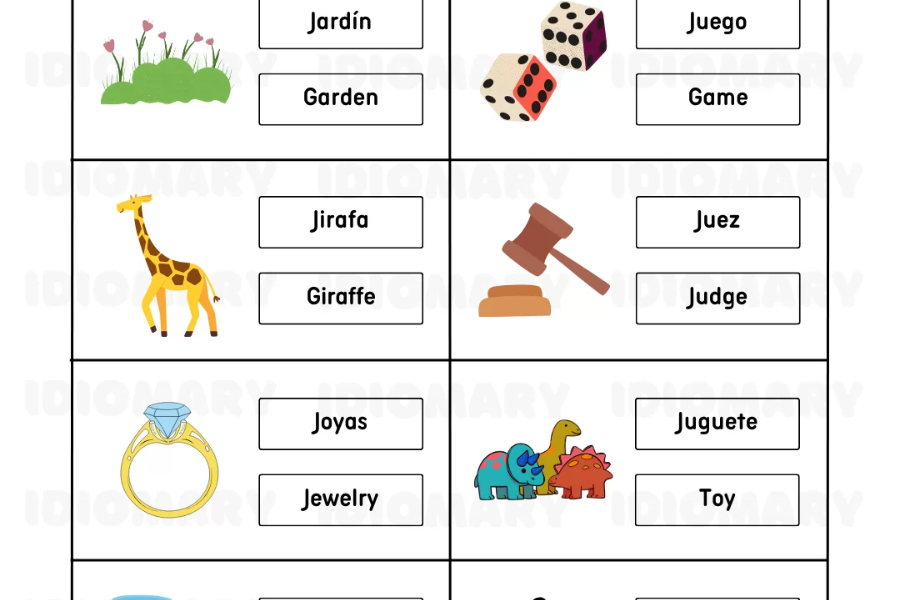Introduction to Spanish Vocabulary
Learning Spanish may be a joyful and useful experience for both students and tourists. One excellent technique to increase your vocabulary is to concentrate on words that begin with specific letters. In this guide, we will look at a range of Spanish words beginning with the letter “I,” their meanings, and how they are used in context.
Why Learn Spanish Words That Start With “I”?
Studying words based on their first letters might help organize language thematically and boost memory recall. In Spanish, the letter “I” begins several key words, such as nouns, adjectives, and verbs, which are commonly used in everyday discussions, education, and the workplace.
Common Spanish Nouns That Start With I
Here are several nouns that begin with “I” and their English translations:
- Iglesia – Church
Example: La iglesia está cerca del parque. (The church is near the park.) - Isla – Island
Example: Visitamos una isla hermosa en el Caribe. (We visited a beautiful island in the Caribbean.) - Invierno – Winter
Example: El invierno en Canadá es muy frío. (Winter in Canada is very cold.) - Idea – Idea
Example: Tengo una idea para nuestro proyecto. (I have an idea for our project.) - Imagen – Image / Picture
Example: La imagen es borrosa. (The image is blurry.)
These nouns are essential for basic conversations and are used in various contexts.
Spanish Adjectives That Start With I
Adjectives help describe nouns and are important in forming detailed sentences. Below are useful Spanish adjectives beginning with “I”:
- Importante – Important
Example: Es una decisión importante. (It is an important decision.) - Increíble – Incredible
Example: La vista desde la montaña es increíble. (The view from the mountain is incredible.) - Inteligente – Intelligent
Example: María es una estudiante muy inteligente. (Maria is a very intelligent student.) - Interesante – Interesting
Example: Leí un libro muy interesante. (I read a very interesting book.) - Imposible – Impossible
Example: Nada es imposible con esfuerzo. (Nothing is impossible with effort.)
These adjectives help add color and emotion to conversations.
Spanish Verbs That Start With I
Understanding verbs is crucial for communication. Here are some common Spanish verbs that begin with “I”:
- Imaginar – To imagine
Example: Me gusta imaginar diferentes finales para la película. (I like to imagine different endings for the movie.) - Imprimir – To print
Example: Necesito imprimir el informe. (I need to print the report.) - Investigar – To investigate
Example: El periodista va a investigar el caso. (The journalist is going to investigate the case.) - Insistir – To insist
Example: Insistió en pagar la cuenta. (He insisted on paying the bill.) - Invitar – To invite
Example: Vamos a invitar a todos nuestros amigos. (We are going to invite all our friends.)
Learning these verbs can help form complete and functional sentences.
Spanish Adverbs and Prepositions That Start With I
Though fewer in number, some adverbs and prepositions beginning with “I” are also useful:
- Incluso – Even / Including
Example: Todos fueron a la fiesta, incluso Pedro. (Everyone went to the party, even Pedro.) - Igualmente – Likewise / Equally
Example: Igualmente, gracias por venir. (Likewise, thank you for coming.) - Inmediatamente – Immediately
Example: Llamó inmediatamente a su jefe. (She called her boss immediately.)
These help provide more nuance and detail to Spanish expressions.
Spanish Words That Start With “I” for Beginners
If you are just starting to learn Spanish, it’s best to begin with high-frequency, easy-to-pronounce words such as:
- Ir – To go
- Ira – Anger
- Isla – Island
- Idea – Idea
- Iglesia – Church
Focusing on these can help build a solid foundation in Spanish vocabulary.
How to Practice and Memorize “I” Words in Spanish
To retain and use new vocabulary effectively:
- Create Flashcards – Use apps or physical cards to review words and meanings.
- Use in Sentences – Practice forming sentences using at least one “I” word.
- Label Items – Label household items with their Spanish names.
- Engage in Conversation – Try to use new words in conversations or writing.
Daily practice and exposure are key to mastering any language.
Conclusion
Expanding your Spanish vocabulary with words beginning with “I” is an excellent way to get toward fluency. Whether you’re learning nouns like iglesia, verbs like invitar, or adjectives like inteligente, each word expands your vocabulary. With constant practice and real-world use, these words will quickly become a natural part of your Spanish communication.
Frequently Asked Questions (FAQs)
Q1: What are some common Spanish words that start with I?
A few examples include iglesia (church), invierno (winter), importante (important), and imaginar (to imagine).
Q2: Are there Spanish verbs that begin with the letter I?
Yes, such as imaginar (to imagine), imprimir (to print), insistir (to insist), and invitar (to invite).
Q3: How can I memorize Spanish vocabulary better?
Use flashcards, practice speaking and writing, and engage with native Spanish media to reinforce vocabulary.
Q4: Is “ir” a Spanish word?
Yes, ir means “to go” and is one of the most frequently used verbs in Spanish.
Q5: Are there any Spanish adjectives that start with I?
Yes, including inteligente (intelligent), interesante (interesting), and increíble (incredible).

Leave a Reply